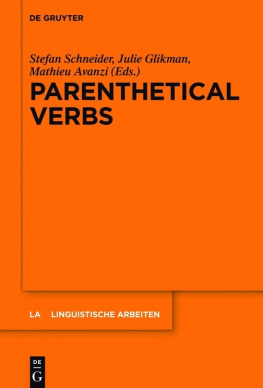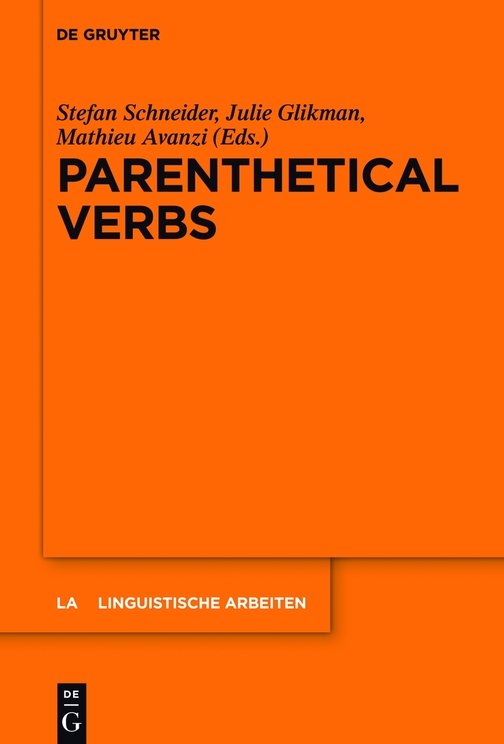Acknowledgements
The contributions in the present volume, except for the invited article by Kaltenbck, Heine and Kuteva, were presented at the workshop Parenthetical verbs: hypotaxis, parataxis or parenthesis? , held 2426 May 2012 at the Paris West University Nanterre La Dfense. The workshop was supported by the Laboratoire MoDyCo (UMR 7114 and CNRS) and by the Karl-Franzens-Universitt Graz.
The papers went through a severe three-stage double-blind reviewing process. We thank all the contributors for their patience, their accurate revision work and for respecting the various deadlines during this period. We are also indebted to the numerous reviewers who generously spent their time and energy in reading and commenting on the papers for the workshop and for this volume. We owe particular thanks to the editors of the series Linguistische Arbeiten for their decisive assistance during the selection and revision of papers. Finally, we want to thank Eva Triebl for the preparation of the manuscript and making it ready for printing.
Mathieu Avanzi
Julie Glikman
Stefan Schneider
Frederick J. Newmeyer
Parentheticals and the grammar of complementation
Abstract : This paper argues that sequences of elements that have the superficial structure of main clauses in parenthetical-type sentences really are main clauses. They are not adverbs, orphans, or some other type of independent structure. This result has two interesting consequences. The first is that it reduces the need for a special type of construction that is not integrated into syntax as a whole. The second is that it reinforces the idea of the autonomy of syntax, namely, that syntactic structure has its own algebra, one that is not derivable from phonology, semantics, or language use.
Keywords : complementation, displacement, parentheticals, orphan analysis, root clause
Frederick J. Newmeyer: Department of Linguistics, University of Washington. Seattle, Washington, USA.
Departments of Linguistics, University of British Columbia and Simon Fraser University. Vancouver, BC, Canada.
1 Introduction
The principal goal of this paper is a very conservative one, namely to argue that what appear superficially to be main clauses really are main clauses. I focus on what I call apparent main clauses. In the broadest sense, I mean by that term any subject-verb pair that co-occurs with what looks like it might be an accompanying subordinate clause. Hence the bold-face items in (1) are examples of apparent main clauses:
- (1) Apparent main clauses in boldface:
- I think we should leave as soon as possible.
- We should leave, I think, as soon as possible.
- We should leave as soon as possible, I think .
As is well known, many apparent main clauses have been analyzed as not being in a main clause relationship with what might be considered to be their complement (among the most important analyses are Haegeman 1988/2009; Peterson 1999; Espinal 1991; and Burton-Roberts 1999). Indeed, such is currently the mainstream position. But before proceeding further, I need to point out that terminological differences are a serious impediment to successful communication when it comes to parenthetical-like entities. For example, one might simply describe I think in (1b) or (1c) as a parenthetical, without thereby rejecting the idea that it was syntactically a main clause at one point in its derivation. But for some scholars, labelling something as a parenthetical embodies a commitment to an analysis that exempts it from processes or constraints governing non-parentheticals. Let me stress that when I use the term parenthetical in this paper, it will be in a purely descriptive sense, namely, one that does not imply a commitment to a particular analysis.
In terms of analysis, I contrast two positions:
- (2) Two positions on apparent main clauses:
- The root analysis: They are complement-taking clauses at one point in their derivation.
- The non-root (rootless) analysis: They are never complement-taking clauses.
In this paper, I argue in favour of the root analysis and against the non-root (or rootless) analysis.
Position (2b) allows for a number of very different ways of looking at apparent main clauses. They are listed in (3a-g):
- (3) An apparent main clause will be considered rootless if it is analyzed as one of the following:
- syntactically adverbial
- syntactically subordinate
- not integrated into the structure
- fragmentary
- an orphan
- requiring a special discourse-related node like E
- base-generated in non-canonical position.
One could, of course, take the position that sentences like (1a) are structurally ambiguous, manifesting both the root and the rootless structure. While such a position is not unreasonable a priori, I argue below that the published arguments for a rootless structure of such items are very weak.
There is a wide range of claims about the syntactic rootlessness of apparent main clauses. A to D present them in order from strongest to weakest:
- A. All (or almost all) apparent main clauses are rootless.
The great majority of what have traditionally been analyzed as complement-taking predicates are better analyzed as evaluative (e/e/e) fragments, taking complements that are not grammatically subordinate at all. (Thompson 2002: 136)
- B. All apparent main clauses with particular semantic/pragmatic properties are rootless.
[Complement-taking predicates are rootless when they] function rather like a certain class of adverbs to orient the hearer aright towards the statements with which they are associated. The ways in which they do this may be roughly indicated as being aids to placing the statements aright against the emotional, social, logical, and evidential background. (Urmson 1952: 491)
- C. All apparent main clauses without complementizers are rootless (Thompson & Mulac 1991).
- (4)
- I think that we should leave.
- I think we should leave.
- D. All displaced parenthetical-like apparent main clauses are rootless.
- (5) Its time, I think , to water the lawn.
This paper argues that in each of the above cases, the verb in question is, at some point in the analysis, a main-clause verb taking a subordinate clause. In other words, all apparent main clauses are indeed real main clauses, syntactically integrated into the overall structure. In most cases I will be able to offer positive evidence for the root analysis. In other cases, I will have to content myself simply with showing that the arguments for the rootless analysis are not very strong.
The paper is organized as follows. Section 2 reviews, and attempts to refute, the arguments that apparent main clauses are rootless. Section 3 discusses some broader implications of my results. Section 4 is a brief conclusion.
2 The arguments for and against a rootless analysis of parentheticals
The following four subsections address and attempt to refute positions A, B, C, and D above.
2.1 Refuting the idea that all (or almost all) apparent main clauses are rootless
Let us begin by examining the hypothesis that virtually all apparent main clauses are rootless. While this position has rarely if ever been adopted by generative syntacticians, it is widely current among functional and corpus-oriented linguists (Sinclair 1991; Hunston & Francis 2000; Thompson 2002). For example, appealing to semantic and discourse-based evidence, Thompson claimed that only 5% of all seemingly apparent main clauses in her corpus of natural conversation were root clauses. Boye & Harder (2007), however, examined her data and found that she greatly exaggerated the number of predicates with epistemic, evaluative readings, which for Thompson was the key piece of support for a rootless analysis. But it would be an interesting exercise, I think, to provide positive linguistic arguments for subordination in the traditional grammatical sense.












